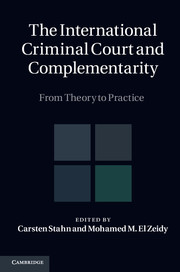Book contents
- Frontmatter
- Contents
- Acknowledgments
- Foreword by HE Judge Sang-Hyun Song
- Foreword by Patricia O’Brien
- Foreword by Silvia A. Fernandez de Gurmendi
- List of abbreviations
- Introduction: bridge over troubled waters?
- PART I General reflections
- PART II Origin and genesis of complementarity
- PART III Analytical dimensions of complementarity
- PART IV Interpretation and application
- PART IV (Continued) Interpretation and application
- PART V Complementarity in perspective
- PART VI Complementarity in practice
- 31 Making complementarity work: maximizing the limited role of the Prosecutor
- 32 Positive complementarity in action
- 33 Complementarity and the construction of national ability
- 34 The Colombian peace process (Law 975 of 2005) and the ICC’s principle of complementarity
- 35 Darfur: complementarity as the drafters intended?
- 36 Complementarity in Uganda: domestic diversity or international imposition?
- 37 Courts, conflict and complementarity in Uganda
- 38 Chasing cases: the ICC and the politics of state referral in the Democratic Republic of the Congo and Uganda
- 39 A problem, not a solution: complementarity in the Central African Republic and Democratic Republic of the Congo
- 40 Complementarity and the impact of the Rome Statute and the International Criminal Court in Kenya
- Index
- References
39 - A problem, not a solution: complementarity in the Central African Republic and Democratic Republic of the Congo
from PART VI - Complementarity in practice
Published online by Cambridge University Press: 05 November 2014
- Frontmatter
- Contents
- Acknowledgments
- Foreword by HE Judge Sang-Hyun Song
- Foreword by Patricia O’Brien
- Foreword by Silvia A. Fernandez de Gurmendi
- List of abbreviations
- Introduction: bridge over troubled waters?
- PART I General reflections
- PART II Origin and genesis of complementarity
- PART III Analytical dimensions of complementarity
- PART IV Interpretation and application
- PART IV (Continued) Interpretation and application
- PART V Complementarity in perspective
- PART VI Complementarity in practice
- 31 Making complementarity work: maximizing the limited role of the Prosecutor
- 32 Positive complementarity in action
- 33 Complementarity and the construction of national ability
- 34 The Colombian peace process (Law 975 of 2005) and the ICC’s principle of complementarity
- 35 Darfur: complementarity as the drafters intended?
- 36 Complementarity in Uganda: domestic diversity or international imposition?
- 37 Courts, conflict and complementarity in Uganda
- 38 Chasing cases: the ICC and the politics of state referral in the Democratic Republic of the Congo and Uganda
- 39 A problem, not a solution: complementarity in the Central African Republic and Democratic Republic of the Congo
- 40 Complementarity and the impact of the Rome Statute and the International Criminal Court in Kenya
- Index
- References
Summary
‘C’est avec témérité qu'on fait ce qu'on fait’
This paper will assess the potential for and limitations of positive complementarity as a tool to enhance the International Criminal Court's (ICC) capacity to end impunity and enforce justice in two of the contexts where the ICC has opened an investigation: the Central African Republic and the Democratic Republic of Congo. It will place the aspiration to achieve positive complementarity in these countries in its socio-political context. This context, it will argue, is one of near-total administrative incapacity to conduct criminal trials in general, and of political unwillingness to prosecute war criminals in particular. Efforts at domestic prosecution cannot be abandoned, but they are best construed as a problem in their own right, not a solution to the ICC's capacity constraints.
The following would appear to be necessary but not always sufficient ingredients for successful domestic prosecution: funding and pressure from the international community, active involvement of local and international civil society actors, and courage and initiative on the part of individual judges and prosecutors. The ICC can only play a modest part in fostering a more enabling culture for such prosecutions. Its main contribution to the restoration of the rule of law is to lead by example.
- Type
- Chapter
- Information
- The International Criminal Court and ComplementarityFrom Theory to Practice, pp. 1204 - 1221Publisher: Cambridge University PressPrint publication year: 2011

